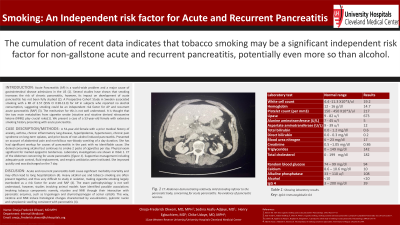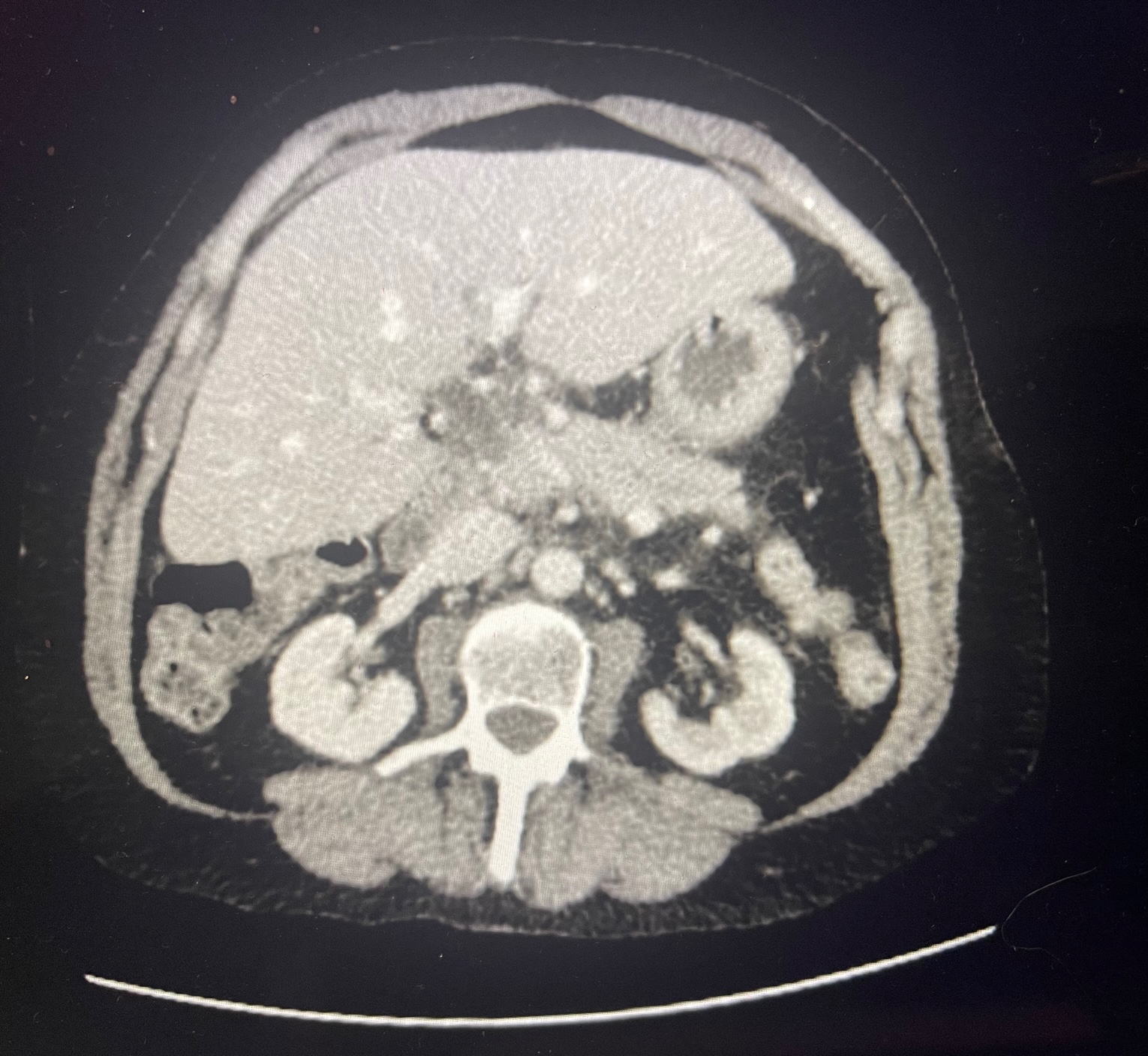Tuesday Poster Session
Category: Biliary/Pancreas
P3528 - Smoking: An Independent Risk Factor for Acute and Recurrent Pancreatitis
Tuesday, October 29, 2024
10:30 AM - 4:00 PM ET
Location: Exhibit Hall E

Has Audio

Onoja-Frederick Okwori, MD, MPH
University Hospitals Cleveland Medical Center, Case Western Reserve University
Cleveland, OH
Presenting Author(s)
Onoja-Frederick Okwori, MD, MPH1, Sedina Asafu-Adjaye, MD1, Chike Udoye, MD, MPH1, Henry Egbuchiem, MD2
1University Hospitals Cleveland Medical Center, Case Western Reserve University, Cleveland, OH; 2University Hospitals Geauga Medical Center, Chardon, OH
Introduction: Acute Pancreatitis (AP) is a world-wide problem and a major cause of gastrointestinal disease admissions in the US (1). Several studies have shown that smoking increases the risk of chronic pancreatitis, however, its impact on development of acute pancreatitis has not been fully studied (2). A Prospective Cohort Study in Sweden associated smoking with a RR of 3.57 (95% CI 0.98-13.0) for AP in subjects who reported no alcohol consumption, suggesting smoking could be an independent risk factor for AP and recurrent acute pancreatitis (RAP) (3). The mechanism for this is not well understood. It is thought that the two main metabolites from cigarette smoke (nicotine and nicotine derived nitrosamine ketone (NNK)) play crucial roles(1). We present a case of a 53-year-old female with extensive smoking history presenting with acute pancreatitis.
Case Description/Methods: A 53-year-old female with a prior medical history of anxiety, asthma, chronic inflammatory lung disease, hyperlipidemia, hypertension, chronic pain syndrome on long-term opiates, and prior bouts of non-alcohol induced pancreatitis. Presented on account of abdominal pain and non-bilious non-bloody vomiting of a day duration. She has had significant workup for causes of pancreatitis in the past with no identifiable cause. She denied consuming alcohol but continues to smoke 2 packs of cigarettes per day. Physical exam significant for marked epigastric tenderness. Laboratory investigations are shown below (Table 1). CT of the Abdomen concerning for acute pancreatitis (figure 1). Supportive management including adequate pain control, fluid replacement, and empiric antibiotics were instituted. She improved quickly and was discharged on the 7th day.
Discussion: Acute and recurrent pancreatitis both cause significant morbidity mortality and may often lead to long hospitalization (4). Heavy alcohol use and tobacco smoking are often present together, and thus very difficult to study in isolation, making cigarette smoking largely overlooked as a risk factor for acute and RAP (4). The exact pathophysiology is not well understood, however, studies involving animal models have identified possible associations involving tobacco components namely, nicotine and NNK through their interaction with pancreatic enzymes, such as trypsinogen and chymotrypsinogen of acinar cells (4). This way, nicotine and NNK induce histological changes characterized by vacuolization, pyknotic nuclei and cytoplasmic swelling consistent with pancreatitis (4)

Note: The table for this abstract can be viewed in the ePoster Gallery section of the ACG 2024 ePoster Site or in The American Journal of Gastroenterology's abstract supplement issue, both of which will be available starting October 27, 2024.
Disclosures:
Onoja-Frederick Okwori, MD, MPH1, Sedina Asafu-Adjaye, MD1, Chike Udoye, MD, MPH1, Henry Egbuchiem, MD2. P3528 - Smoking: An Independent Risk Factor for Acute and Recurrent Pancreatitis, ACG 2024 Annual Scientific Meeting Abstracts. Philadelphia, PA: American College of Gastroenterology.
1University Hospitals Cleveland Medical Center, Case Western Reserve University, Cleveland, OH; 2University Hospitals Geauga Medical Center, Chardon, OH
Introduction: Acute Pancreatitis (AP) is a world-wide problem and a major cause of gastrointestinal disease admissions in the US (1). Several studies have shown that smoking increases the risk of chronic pancreatitis, however, its impact on development of acute pancreatitis has not been fully studied (2). A Prospective Cohort Study in Sweden associated smoking with a RR of 3.57 (95% CI 0.98-13.0) for AP in subjects who reported no alcohol consumption, suggesting smoking could be an independent risk factor for AP and recurrent acute pancreatitis (RAP) (3). The mechanism for this is not well understood. It is thought that the two main metabolites from cigarette smoke (nicotine and nicotine derived nitrosamine ketone (NNK)) play crucial roles(1). We present a case of a 53-year-old female with extensive smoking history presenting with acute pancreatitis.
Case Description/Methods: A 53-year-old female with a prior medical history of anxiety, asthma, chronic inflammatory lung disease, hyperlipidemia, hypertension, chronic pain syndrome on long-term opiates, and prior bouts of non-alcohol induced pancreatitis. Presented on account of abdominal pain and non-bilious non-bloody vomiting of a day duration. She has had significant workup for causes of pancreatitis in the past with no identifiable cause. She denied consuming alcohol but continues to smoke 2 packs of cigarettes per day. Physical exam significant for marked epigastric tenderness. Laboratory investigations are shown below (Table 1). CT of the Abdomen concerning for acute pancreatitis (figure 1). Supportive management including adequate pain control, fluid replacement, and empiric antibiotics were instituted. She improved quickly and was discharged on the 7th day.
Discussion: Acute and recurrent pancreatitis both cause significant morbidity mortality and may often lead to long hospitalization (4). Heavy alcohol use and tobacco smoking are often present together, and thus very difficult to study in isolation, making cigarette smoking largely overlooked as a risk factor for acute and RAP (4). The exact pathophysiology is not well understood, however, studies involving animal models have identified possible associations involving tobacco components namely, nicotine and NNK through their interaction with pancreatic enzymes, such as trypsinogen and chymotrypsinogen of acinar cells (4). This way, nicotine and NNK induce histological changes characterized by vacuolization, pyknotic nuclei and cytoplasmic swelling consistent with pancreatitis (4)

Figure: Fig. 1 CT. Abdomen demonstrating relatively mild stranding inferior to the pancreatic body, concerning for acute pancreatitis. No evidence of pancreatic necrosis.
Note: The table for this abstract can be viewed in the ePoster Gallery section of the ACG 2024 ePoster Site or in The American Journal of Gastroenterology's abstract supplement issue, both of which will be available starting October 27, 2024.
Disclosures:
Onoja-Frederick Okwori indicated no relevant financial relationships.
Sedina Asafu-Adjaye indicated no relevant financial relationships.
Chike Udoye indicated no relevant financial relationships.
Henry Egbuchiem indicated no relevant financial relationships.
Onoja-Frederick Okwori, MD, MPH1, Sedina Asafu-Adjaye, MD1, Chike Udoye, MD, MPH1, Henry Egbuchiem, MD2. P3528 - Smoking: An Independent Risk Factor for Acute and Recurrent Pancreatitis, ACG 2024 Annual Scientific Meeting Abstracts. Philadelphia, PA: American College of Gastroenterology.
